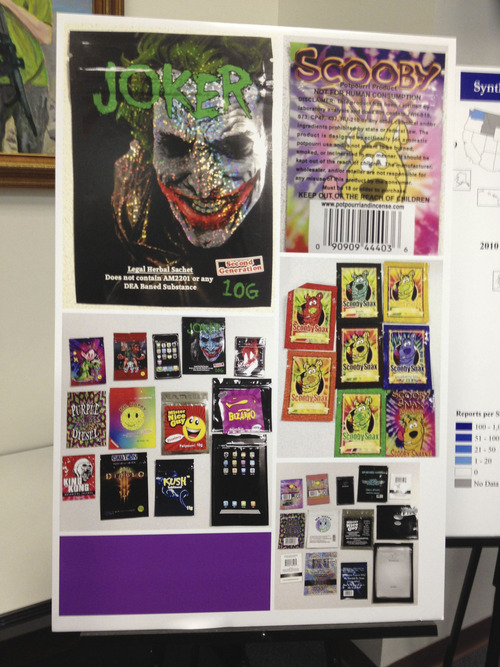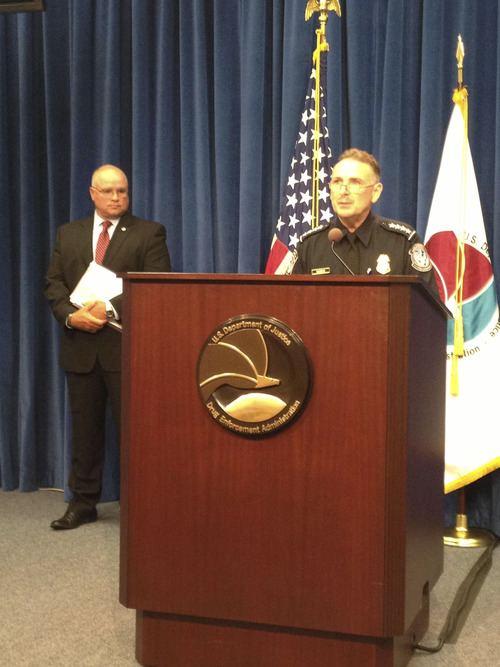This is an archived article that was published on sltrib.com in 2013, and information in the article may be outdated. It is provided only for personal research purposes and may not be reprinted.
Washington • Agents liken the charging of 14 Utahns from St. George and Salt Lake City to cutting "the head off of the snake" of a massive spice distribution ring.
The alleged suspects manufactured synthetic marijuana out of a Hurricane warehouse and shipped it to smoke shops across the country, according to the complaint filed against them in federal court. Hours after executing more than 150 arrest warrants in 35 states and five countries, officials announced at a press conference Wednesday afternoon that they've charged the suspects with conspiracy to distribute a controlled substance and put an end to their suspected two-year drug operation.
"By decimating this massive drug distribution ring in St. George, we have stopped a constant flow of spice to retailers in over 20 cities across the United States," said Barbra Roach, Drug Enforcement Administration Rocky Mountain Division special agent in charge, in a statement.
The investigation started in December when officials discovered 9,644 packets of spice on the way to Illinois smoke shops from St. George, marketed under brands like Gods of Spice and Blue Heaven. Illinois officers contacted DEA agents in Utah, who launched the investigation with state and local law enforcement.
According to the complaint, the suspects started manufacturing large amounts of illegal spice in a Hurricane warehouse in March 2011. They would spray the chemicals onto leaves, chop them up and package them in 1 to 3-gram baggies, marketing them to teenagers, said DEA case agent Andy Large.
Since April 1, 2011, the Utah suspects have distributed roughly 2,652 pounds of the drug and made more than $11 million proceeds, according to a U.S. Department of Justice news release.
In March, the Washington County Drug Task Force executed a search warrant at a Santa Clara home rented and occupied by some of the suspects. Inside, they found four 50-gallon barrels of Ethanol 200, a binding agent, more than 300 kilograms of a plant material and seven bags of white powder believed to be spice chemicals, according to the news release.
In the days following the search, two of the suspects began removing lots of material from the Hurricane warehouse, the release adds. Officers followed one of them to the Washington County Landfill where they recovered Gods of Spice packaging, bottles of flavoring, an operating agreement for Gods of Spice, payroll summaries and hundreds of invoices, according to the release.
The complaint states seven of the suspects were the organization's leaders. They obtained the raw materials, organized the distribution and laundered money, among other things, according to the release. The other suspects were hired or otherwise assisted in the drug manufacturing and distribution, as well as money laundering, the complaint adds.
Independent of the investigation launched by the information from Illinois, Homeland Security agents seized two packages of spice chemicals coming into the United States for the suspects, including a shipment from China.
The St. George facility was just one piece of an international synthetic drug organization that law enforcement agents chipped away at all year. The DEA's Project Synergy has resulted in the seizure of more than 1,000 kilograms of illegally imported synthetic drugs and on Wednesday, agents executed more than 150 arrest warrants in 35 states and five countries.
Two types of drugs generally come from Asian countries and are processed and sold in the U.S. One set of drugs, called synthetic cathinones, are usually marketed as bath salts, jewelry cleaner or incense, and these drugs can cause a number of dangerous side-effects, including vomiting, anxiety, seizures and hallucinations. The other, cannabinoids, are essentially synthetic marijuana that is more potent than the real thing.
"We're using every tool in our tool box to go after these organizations," said James Capra, chief of operation at the DEA. He called the organizations' targeting of young people by using popular figures such as Scooby-Doo and King Kong on the packaging "a level of evil that most people don't understand."
People who use the synthetic drugs have no idea what chemicals were used to make them and what they are putting in their bodies, said U.S. Attorney David Barlow in a statement. He added that the drugs are often sold in false or misleading packaging, which makes them more dangerous. "Those who use them may believe that if they can purchase them at a store or online, they must be legal and safe. They are neither, and those who manufacture or distribute these drugs in Utah will face prosecution."
The investigation and subsequent arrests were announced in a small conference room behind a wall of security at the DEA's headquarters in Arlington, Va. Capra was joined by U.S. Customs and Border Protection Acting Assistant Commissioner David Murphy, Traci Lembke from Homeland Security Investigations, Australia's acting ambassador to the U.S. Graham Fletcher and several DEA case agents to explain Project Synergy and its impact.
"It's been an extended investigation, and they're doing significant asset seizures out there also, bank accounts and the like," he said.
Conspiracy to distribute a controlled substance carries a potential sentence of 20 years in federal prison. The defendants who were arrested in St. George are expected to make their first court appearances at 1:30 p.m. Thursday.
Twitter: @mikeypanda





